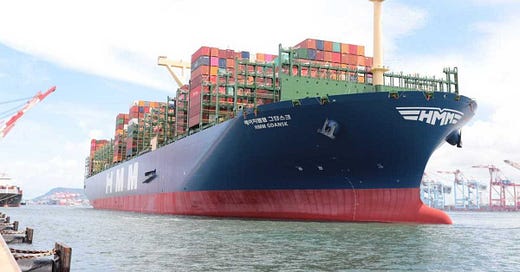Looming Electoral Disaster Threatens Taiwan’s Tariff Preferences
Without 2010 economic cooperation pact, Taiwan to lose attractiveness as triangular trade hub
By: Jens Kastner
With Taiwan’s January presidential and legislative elections dynamics strongly signaling that the anti-unification Democratic Progressive Party (DPP) will stay in power and that the presidency will go to the current vice president Lai Ching-te, who is regarded as even more anti-China than the incumbent Tsai Ying-wen, it is increasingly likely that China will end a 13-year-old free-trade agreement that mainly benefits Taiwan’s exports to China, including industrial inputs destined for Taiwanese-owned mainland factories.
On January 12, just a day before Taiwan's presidential election, China’s Ministry of Commerce is scheduled to complete an investigation under the Economic Cooperation Framework Agreement (ECFA) into the trade barriers imposed by Taiwan on 2,460 items of Chinese products.
In mid-August, China retaliated against Taiwan for Lai’s two-day "stopover" in the US on his way to Paraguay, Taiwan’s last South American ally, to attend a presidential inauguration by imposing anti-dumping tariffs on polycarbonate imports from the island. Such exchanges between Taiwanese government bigwigs and foreign counterparts are anathema to China’s unification agenda, as manifested last August when Beijing responded to a visit by US House Speaker Nancy Pelosi with a short blockade of Taiwan’s main ports, and with Chinese customs authorities suspending the entry of Taiwanese citrus fruits and certain types of fish over alleged pests and contamination with excessive chemicals respectively.
The Taiwan Affairs Office of China’s State Council also recently signaled that the ECFA’s preferential tariffs may be canceled completely. China including Hong Kong constitutes Taiwan’s largest export market by far, making up for one-third of the total. The ECFA, when it was implemented, cut tariffs on 539 Taiwanese exports to China and 267 Chinese ones to Taiwan. Taiwan maintains a huge trade surplus amounting to more than US$100 billion with Hong Kong and China combined according to Statista.
“If the ECFA investigation is completed in accordance with the procedure, then mainland China can announce its conclusion depending on the result of Taiwan's presidential election and the unilateral preferential tariffs given by the mainland to Taiwan will evaporate in one night,” recently warned the China Times, a Taiwanese daily seen as the Chinese Communist Party’s mouthpiece on the island. ”Consequently, ‘Lai elected, ECFA lost’ may become the mainland’s new script for Taiwan after the election.”
With Terry Gou, the tycoon founder of iPhone-assembler Foxconn, announcing on August 29 that he intends to run as an independent candidate in the presidential election, Taiwan’s China-friendly vote seems likely to be split between Gou, former Taipei mayor Ko Wen-je of the Taiwan People's Party (TPP) and the Kuomintang’s Hou Yu-ih, a former mayor of New Taipei), which would translate into a comfortable win for Lai.
Speaking to Asia Sentinel, observers agreed that although China’s threat to end the ECFA is unlikely to significantly change Lai’s electoral prospects, the economic repercussions of a scrapping would be considerable. For example, Li-Jiuan Chen-Rabich, professor of European studies at New Taipei’s Tamkang University, warned that “Taiwan would lose great benefits in terms of three-way trade, especially under the frame of the WTO,” given that Taiwanese manufacturers typically produce goods on both sides of the 180-km Taiwan Straits for export to other countries.
Reinhard Biedermann, a German professor of international relations at Tamkang University, forecast that it would also become even more difficult for Taiwan to sign regional trade agreements than it had been prior to Beijing’s granting under the ECFA trade preferences in 2010. “The ongoing ECFA investigation is one tool among many that the shrewd Chinese have hatched out to cause disturbance, and it is basically about creating something out of nothing in accordance with the ancient Chinese stratagem wú zhōng shēng yǒu [無中生有],” he said.
Nonetheless, Shen Yu-chung, a political science professor at Tunghai University, believes that China’s attempt to influence voters with economic threats is currently facing headwinds given Taiwan’s recent announcement that it plans to resume cross-strait tourism in a month. Taiwan banned Chinese tourists and businesspeople during the Covid-19 pandemic, as well as mainlanders from traveling to Taiwan individually and in tour groups. China has since January been gradually lifting pandemic-era restrictions on group tours to dozens of countries, but countries that have especially politically fraught relations with China of late, such as Taiwan and Canada, were not reinstated.
Prior to China’s ban and Covid, China had been Taiwan’s largest visitor source, making up 24 percent of the total in 2018.
“Taiwan is open, but China is still restricted, so the Taiwanese voters see that the problem is not in Taiwan,” Shen said. “Taiwan's tourism industry had originally planned to stage rallies for a resumption of tourism from China, but now that Taiwan has opened up, the pressure is thrown back on Beijing.”



